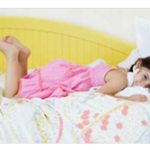What is bedwetting?
The most common urological problem seen in children is bedwetting during sleep. The estimated figure is of around 80-110 million enuretic children in the world. About 10-20% of 5-6-year-olds are known to wet their bed. Enuresis is more common in first-born children, more in boys than in girls, and is much more if the parents have also had similar problem or if there is a family history. If one parent of such a child has had a similar problem there is a 44% chance of a child being a bed wetter. If both parents have had this problem then there is a 77% chance of children suffering from a similar problem.
Enuresis is considered a disorder only if the child is at least 5 years of age and the problem continues more or less continuously for approximately one year. It is primary enuresis if it has been since birth and considered secondary enuresis if it starts between the age of 5 and 8.
Apart from the commonly faced problem of changing the sheets, this needs to be handled sympathetically because it affects the self esteem of the child, a positive change occurring in children, who are successfully treated. Therefore treatment is definitely worthwhile.
What are the causes of bedwetting?
While sleep bedwetting can be caused by a variety of urological problems, it is very uncommon for child with bed wetting to have any major urinary problem. In our general clinic, we find only 1-4% to have any urinary abnormality. While bedwetting can cause some psychological problem in children, all enuretic children are psychologically normal. A psycho-pathology is not a causal problem for primary enuresis, and therefore such treatment is ineffective in reducing bed wetting. There are numerous theories that have been put forth about a causation of enuresis. This is generally considered a disorder of delayed maturation. Other contributory causes may be a deficiency of a hormone which permits large urine volumes to be formed through the night, which the bladder cannot hold and therefore empties. Some of these children are thought to have a respiratory block, either due to adenoids or tonsils and therefore have enuresis. Removal of these tonsils has sometimes been found to lead to an improvement in their bedwetting. Milk foods, drinks containing caffeine and large fluid intake have also contributed to bedwetting. Some allergies like fever, eczema, rashes, food and drug allergies are also thought to contribute.
What are the tests required?
Since only a very small percentage of these children have an organic urinary abnormality, evaluation of these children is very basic, which includes a physical examination, urine microscopy and an ultrasound evaluation. The main and most important test is bladder diary, in which record of each void, along with the time and quantity, accurately along with urine leak is noted down. Also record all types of fluid intake, which will include water, milk, coffee, juices, alcohol, water along with food etc.
What are the treatment options?
If all these investigations are normal, treatment options for this condition is drug therapy and behavioral modification, quite often success being achieved with a combination of both.
Behavioral modification:
The following are the recommendations for the most efficacious evaluation and treatment plan.
- The doctor should screen to rule out any possible urinary abnormalities. If something is found, the referral can be made to the Urologist
- All children should decrease their liquid intake by one half normal levels from evening onwards
- Most children should avoid caffeine
- Children should urinate just before going to bed.
- Children should get adequate time in bed. The average 8 year old needs about 10 hours of sleep per night
- Use an alarm to wake up and pass urine at night and due positive reinforcement for dry nights. Parent should not punish children for this problem.
- To help them have a positive outlook, children may be made to change their bed linen when wet. Do not use diapers for these children
- A progress chart will be a good record for these children
Pharmacological therapy:
On special occasions such as overnight visits to relatives or friends, medications may be used. Depending upon the volume of urine overnight, the appropriate drug may be chosen to either increase the bladder capacity (Imipramine) or decrease the urine output (Vasopressin) based on your child’s bladder diary.

